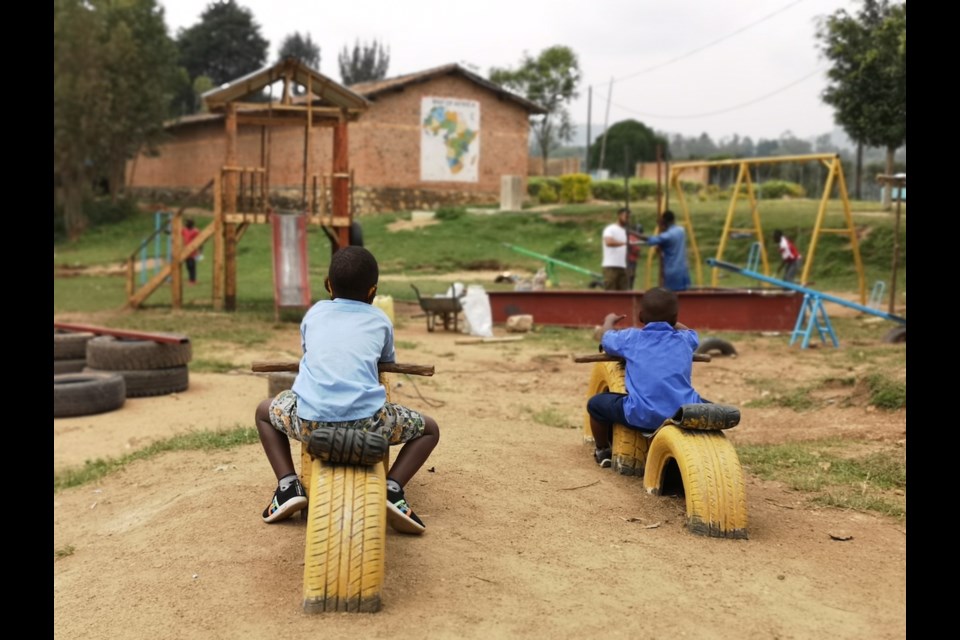Reza Marvasti is in South Sudan building playgrounds for children who haven't had opportunities to play the way Squamish kids do.
Marvasti is the founder and CEO of The Power of Play, a non-profit based in Squamish.
He is currently building playgrounds in an orphanage and two refugee camps.
Reached by Zoom in South Sudan, where he is staying in a non-governmental organization compound, Marvasti said the idea behind the projects is that play is fundamental to every child's development.
Article 31 of the UN Convention on the Rights of the Child states that "That every child has the right to rest and leisure, to engage in play and recreational activities..."
Studies show play is essential for everyone's emotional, social and physical development.
"Even many of us adults, especially the ones who choose to live in Squamish, spend a good amount of time every week playing," Marvasti said.
One of the South Sudan camps that will be getting its first playground has around 5,300 children, while the orphanage has about 960 kids, he said. Many of these children were previously child soldiers or had been victims of "sex" trafficking.
COVID-19
Marvasti said the spread of COVID-19 is "one of the least concerns here."
Many other infectious diseases are more of a concern in South Sudan, he said, such as malaria.
"And that is beside the civil war that is happening right now, the genocide that is happening right now."
South Sudan is a "no-go" zone for travelling.
But Marvasti did have to get COVID-19 tests and quarantine once there.
The organization has built 20 playgrounds so far.
Other locations include San Ignacio, Nayarit, México Pune, Maharashtra, India, and in Nyanza, Rwanda.
In Canada, the organization is also building a playground for the Lytton First Nation.
But the children in South Sudan face the most obstacles he has seen.
"I have been here for about a week, and I am still comprehending what is happening here. It is just beyond the wildest imagination that I ever had," he said.
Right outside his walls, he can hear shooting, he said.
"I am just honoured to be here and to be able to do something for these little kids."
His team travels in a convoy to the refugee camp or orphanage in an NGO convoy for safety and then builds the playground in one two-week stretch.
He said what isn't widely known is that the refugee camps often don't include playgrounds at all.
"It is neglected in many places," he said, "Even in UN refugee camps, there is no playgrounds. It has been so overlooked."
Leaving Squamish
Marvasti's road to building playgrounds in underprivileged places started with a realization that his Squamish adrenaline junkie ways — walking away from many accidents — would eventually catch up with him.
"I used to be an adventure seeker and adrenaline junkie until 2016, when I walked away from my last near-death experience during speed flying. [A] few days after my crash, Kyle Wolochatiuk had a similar accident and passed away. He never had the chance to play with his daughter," Marvasti recalled, noting that he started to ask himself what his life's purpose was.
He travelled for a while and noticed that there are many places where children live in the streets.
"They were more like adults in a small size. Something is missing. They aren't kids. It took me some time to realize that for a kid to be a kid, they need to play and that is what is missing in those kids' lives," he said.
He came back from his travels with the idea of building playgrounds.
Formerly a developer, he sold all he had and launched his organization.
"Ever since I dedicated my life to bring play for the children in need around the globe, so they have the opportunity to fully develop and grow through the power of play."
He said seeing the smiles on kids' faces when they play on what is perhaps the first playground they have seen, he knows he made the right choice for his life.
Marvasti grew up in Iran. He came to Canada in 2002 and moved to Squamish in 2012.
He was born during the war between Iran and Iraq.
"I realized not long ago that I don't have trauma from the war," he said. "We played. Whenever they were attacking us, the bombers would come, we always had to go to my aunt's to go in the basement, turn all the lights off, and the parents would say to be quiet, 'It is time to hide.' For us, 'time to hide' was hide-and-seek!"
Community-led
In recent years there has been an acknowledgment that Westerners heading to impoverished places to do good works can be problematic when they ignore local knowledge and culture and instead impose Western ideals—dropping in and leaving something of little value behind.
Marvasti is aware of that trap and works to ensure the playgrounds are ethical.
"All of our projects are community collaboration," he said.
Labour and supplies are sourced locally, and they take inspiration for the design of the playgrounds from the surrounding area.
"If they build their roof from grass, we ask them to build the cubby house roof from the grass."
The children at the institution where the playground is built contribute their ideas for the play structure.
"We get the kids together. We give them pens, pencils, and crayons and we ask them, 'How would you like to play.'"
The goal is to empower, he said.
To learn more go to The Power of Play website.
**Please note, this quote was corrected after the story was published to say 'crayons' as opposed to 'carry on': "We get the kids together. We give them pens, pencils and crayons and we ask them..."


